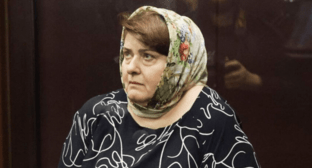18 January 2004, 20:29
Election as line
So democracy in Russia seems to have finally been overthrown; in the meantime, however, nearly all the key voices concerned about this fact are for some reason again abroad. The reinforcement of the hierarchy of power which Putin was saying so long was so necessary has finally been completed by the election to the Russian Duma.
In the Caucasus, elections followed the nationwide scenario, save for Ingushetia and Chechnya where the communists had long before lost the least significant positions. Victory through single-member constituencies in the North Caucasus republics was chiefly gained by candidates supported by local authorities. North Ossetia and two constituencies in Dagestan made an exception, where candidates won that were rather in opposition to the republican government.
It seems Russia's democratic community has already written its hands into blood, stigmatizing and condemning the recent Duma election and even the presidential election which has not taken place yet. However, what we see is that Dostoevsky's grand inquisitor is once again right: "...they will bring their freedom to our feet and tell us, 'You better enslave us, but feed us.' Finally, they will understand that freedom and bread of earth in plenty for everyone are impossible..."
A Pharaoh for Russia
Extremely centralized government and meticulous regulation of public life in Ancient Egypt proceeded from the relation between the situation in the country and Nile high water. In Russia, high water is replaced by "high oil and gas" - probably, this is the source of the need for a Pharaoh. The Pharaoh, too, will be ready in a short while. Some economists claim democracy in Russia is doomed for vegetation as long as oil prices are high.
Obviously, regulation of the oil pipe valve does not require great creativity, there is no need for free competition and other "excesses." So the system has chosen what it was to choose - operation at minimum costs.
Prison for peoples
What is to be done about a people if it does not want to live in the federation? It turns out there is practically only one answer today: it is destroyed.
Democracy in Russia was lost in Chechnya, long ago: the second Chechen war solely enabled actual handing over of presidential authority from Yeltsin to Putin. Only in the name of the supreme purpose - preservation of the state's integrity - it was first possible to limit and then regularly to destroy freedom of the press. Representative democracy without free media quickly becomes fiction. The price for subdued Chechnya was corresponding - prostrate Russia, and the size does not matter.
In spite of all reinforcements of the hierarchy of power in the Russian Federation, the danger of its disintegration is still alive. Since the most vivid example is Chechnya, state figures think the key threat proceeds from ethnic autonomies. That is why Russian statesmen propose projects of provincialization of Russia or "cultural autonomies" instead of political ones, and so on. They have even invented a ban on using alphabets other Cyrillic. What's there different from regulation in Pharaoh-era Egypt?
Russia without a concept
For all that, Putin's power is weak enough to collapse practically at any moment. And, as is usually the case, the same means he used against others will most likely be used against him.
Today, there is no concept of Russia as it is, which means there is no potential for national growth and development. The vulnerability of "Putin's" Russia became quite obvious when the United Russia party refused to take part in public debates on television. Its insolvency can grow clearer only when the matter under discussion will be about state creative work proper - pending amendments to the Constitution and the post-oil economy in Russia.
The "great nation" concept became a product for domestic consumption practically long ago, and even inside the country its performance is declining. The day when Russia openly and voluntarily gives it up will perhaps become the start of a new, democratic Russia.
Author: Valery Dzutsev, CK correspondent Source: Caucasian Knot




